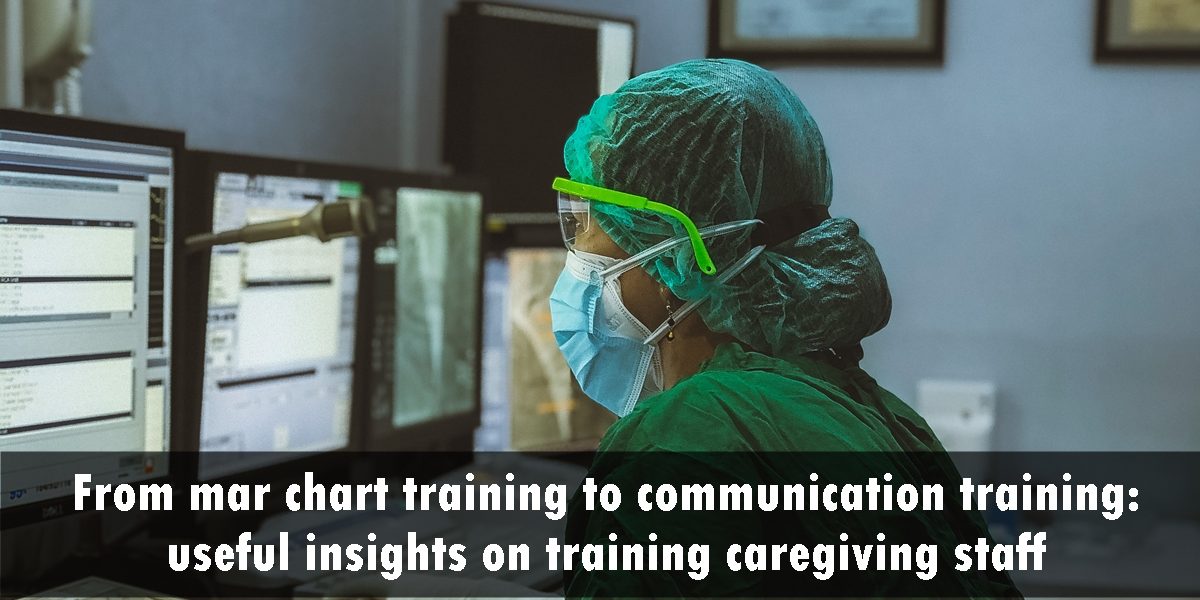A caregiver needs a wide range of skill sets to meet different challenges he/she will come across in a day. From medication administration documentation and organisation skills to communication skills – here we discuss some important skills that caregivers must master to provide quality care to the residents. As a care home manager, you must ensure that your staff receives regular training to nurture these important skills.
- Medication administration documentation: Medication administration is an important responsibility. Caregivers who prepare and administer medications are responsible for their own actions. Caregivers must know the “Rights” of medication administration to reduce medication errors. Another important aspect of medication administration is medication documentation which needs to be done after the medication is administered. Here’s a useful read on MAR sheets and medication administration. As more care homes in the UK are shifting from MAR charts or sheets to eMAR, here we briefly discuss some of the benefits of using eMAR. Each entry into eMAR is automatically date and time stamped – it makes documentation and tracking of patient care easy. Also, it provides easy access to important data. Caregivers can quickly find the information about a patient without searching through paper-based records.
If your care home facility is planning to use eMAR, train your staff on how to use the software. You can book an eMAR demonstration with us. Should you decide to book a demo, we can implement eMAR training and set up remotely for you. If your care home facility still uses MAR charts, it’s important that you provide MAR chart training to your new staff.
- Communication skills: Communication skills include written, verbal and non-verbal methods. A caregiver must communicate clearly, tactfully and with respect for the feelings of others. For new caregivers, you can arrange training sessions on effective communication. Over here we discuss some important forms of communication that caregivers must master:
- Verbal communication: Verbal communication involves sharing messages using words. There are different types of verbal communication – one type of verbal communication is formal and structured; whereas another is informal and flexible. Caregivers must master both formal and informal verbal communication skills.
- Non-verbal communication: Non-verbal communication involves sharing messages without using words. It refers, among other things, to a person’s tone, clothes, body posture, facial expressions and hand movements.
Here are some strategies that caregivers must follow when communicating with seniors:
- Listen to the resident before you attempt to impart information
- Be patient
- Speak at a normal rate
- If the resident is unable to hear you, do not shout. Move closer and speak in a normal tone
- Notice carefully the body movements and facial expressions of the resident to understand them
- If the resident gets confused while speaking, give him/her time to recollect thoughts
- If the resident is having trouble understanding your question, rephrase it.
- Written communication: Caregiving staff have to write various types of letters and emails such as order supplies, replies to various types of inquiries and written instructions for patients. Care home managers can schedule training sessions to help the staff master the needed skills to write effective letters and emails.
Here are some basic tips to help caregiving staff write accurately and effectively:
- Use proper terminologies
- Follow the style and format determined by the caregiving facility
- Establish a professional tone of voice
- Use simple language and short sentences
- One sentence should convey one idea
- Organisation skills: The caregiver must be given training on prioritising tasks and how to work efficiently and methodically. They should know to complete given tasks within the timelines without compromising on the quality. When caregivers are organised, they are less likely to suffer from caregiver stress – as they plan the day to balance work and rest times. Also, they must know when a task needs to delegated to a team member who has the expertise and the time to complete the task







